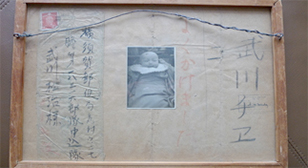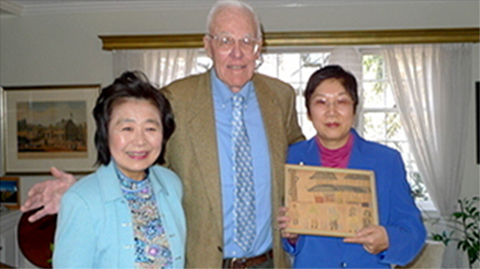Soldier Reunites Father and Daughter 64 years Later
In 1944, in the midst of the Second World War, Yoko Matsumura’s mother was three months pregnant with her when her father was called for military duty by the Japanese Army. Although Matsuji Takegawa had been drafted to two other military rotations, he was called again, this time to Iwo Jima. He never returned.
64 years later, Yoko, who came to the United States in 1973 as one of the first wave of Japanese missionaries, received a call informing her that a U.S. veteran had returned home from battle with an envelope containing a photograph and a child’s drawing that had been in her dead father’s shirt pocket. The veteran, Franklin Hobbs, had located Yoko and her family, and now wanted to return the envelope to its rightful owners.
Hobbs, who was born in Bedford, Mass., and orphaned at age five, went on to live with his grandmother, who helped fund his education. He was 19 and studying economics at Harvard College when he was drafted by the U.S. Military, and was sent to Iwo Jima on June 9, 1944, three days after D-Day.
He had been driving a truck when he saw the bodies of Japanese soldiers lying on the ground and a U.S. intelligence officer examining the bodies for possible evidence.
Hobbs recalled that the US intelligence officers had prohibited soldiers from taking home swords, and so he had picked up the envelope as a souvenir. “He was lying there outside a cave. I happened to see this envelope and when I saw the picture I said, ‘boy I’m taking this.’ ” He explained, “they were all anti-Japanese at the time,” and he recalled being struck by the picture and drawing, thinking, “God, they are just like we are, he had a nice family.”
Hobbs took the envelope home with him and it hung in a frame in his younger son’s room. Late last year, Hobbs met a Japanese woman at his church, and discussing it with his wife, Marge, requested the help of the woman in locating the family of the dead soldier to return the items. Although several museums expressed interest in the items, Hobbs wanted only to return it to the family, explaining, “it was probably because I knew what it was like to grow up without a mother or father.”

According to Yasuharu Shinto, the head of the Information and Cultural Division of the Embassy of Japan, there are 4 to 5 cases annually of American soldiers returning items such as letters, flags and clothes to the original owners in Japan. During World War II military guidelines were not as strict, and it was common for veterans to return home with items such as grenades, pistols and helmets.
While the usual protocol is to use diplomatic channels, according to Shinto, “this time, Mr. and Mrs. Hobbs were very much eager to give it back to the public by themselves so they paid much effort to find the family.”
The Japanese woman, Reiko Wada, contacted the Japanese government, and through investigating the address on envelope, the soldier’s family was located. In October last year, Chie Takegawa, who runs a liquor store in a small city in Japan, received notification that her father’s envelope had been discovered, and that the American soldier wanted to return it to her.
Chie recalled, “I was very surprised. I was so ecstatic that I was trembling.” She immediately contacted her younger sister, Yoko, the little baby girl in the picture. “It kind of feels as though my father has returned. I want to know the whole story and to be able to meet [the former U.S. soldier] to ask him. I deeply appreciate his framing the articles and preserving them with care. When my sister returns, we’d like to take the articles to our family temple to have a Buddhist monk recite a sutra and also pay our respects at our father’s grave,” she said.
In March, Yoko Takegawa, who emigrated to the United States in the 1970s, and now living in Fort Lee, N.J., set out with her family to meet Hobbs and his family at The Country Club in Chestnut Hill, Mass. The two families exchanged gifts and Franklin Hobbs finally handed over the framed envelope and its contents.

Japan’s Consul General in Boston, Masaru Tsuji, who was present at the meeting, wrote over email, “What happened more than 60 years ago brought the people together with the help of the letter the deceased father had held in Iwo Jima. I felt that the letter served as a bridge not just between Yoko-san and Mr. Hobbs, but between the people of the two countries over the mutual tragic history.”
Hobbs, who was a business owner and holds an MBA from Harvard Business School, explained later in a phone interview, “I was doing it because it was nice, and I wanted her to have it.” Upon meeting Yoko he recalled, “The profundity of it hit me when she came. And then I thought, ‘Isn’t this fantastic that she came.’ It turned out that it was important to them. A lot more important than I thought it would be.”
In an interview, her daughter, Keiichi, explained, “I think my mom has had a hard life and she is just enjoying what is happening. She never knew or met her father, and so just knowing he had a picture of her in his dying moments meant a lot to her.”
For Yoko, the experience was transformative. She explained, “My father’s military pension was used to fund my college education, and so even though I never met him I was always grateful to him for his financial contribution to my life. When I heard that he carried my picture with him, I realized that he has always been loving me and I felt his love. Sometimes I wonder if I was meant to come to America so that I could meet Mr. Hobbs.”
Yoko and her sister Chie visited their father’s grave together in April, and the frame now hangs in Chie’s house in Sanjo City, Japan.
Yoko’s story has been featured by various media organizations including Japan’s Kyodo News, TBS, the Sanjo City local paper, Massachusetts’ Brookline Tab and New Jersey’s NY Japan. The New York Times will be printing her story in the near future.
Hobbs reflected, “It’s been a great experience in my life.”
Written by Harumi Kawamura

